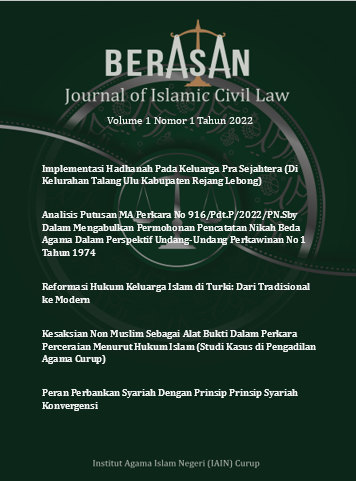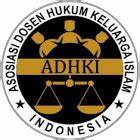Peran Perbankan Syariah Dengan Prinsip Prinsip Syariah Konvergensi
DOI:
https://doi.org/10.29240/berasan.v1i1.4735Keywords:
Sharia Banking, Sharia Supervisory Board, Islamic Banking LawAbstract
This research is entitled The Role of Islamic Banking with Convergent Sharia Principles on Indonesia's Socio-Economic Construction. This study aims to determine whether sharia banking and sharia principles in Indonesia are in accordance with Islamic law and to find out how the convergence of sharia principles to the socio-economic construction of Indonesia. The research method used is a normative juridical approach with the data used are secondary data, and the data is analyzed juridically and quantitatively which is then interpreted from the results of data analysis in the form of deductive conclusions. Islamic banks are banks whose activities refer to Islam and in their activities do not charge interest or pay interest to customers. Islamic bank rewards received or paid to the bank, the agreement (contract) contained in Islamic banking must be subject to the terms and pillars of the contract as stipulated in Islamic law. Basically, Islamic banking in Indonesia has not been running in accordance with the rules of sharia law, therefore the Sharia Supervisory Board does not yet have clarity regarding the scientific capacity and capability of its interest in Indonesian economic issues, especially sharia banking. For this reason, there needs to be transparency from the MUI towards Islamic banks regarding the recommended DPS candidates, even if it is necessary there must be a fit and proper test mechanism for DPS candidates, especially those not from academia.
Downloads
References
A. Karim, Adiwarman, 2001, Ekonomi Islam: Suatu Kajian Kontemporer, Jakarta:
Gema Insani Press, Cet-1.
Ali, Zainuddin, 2006, Hukum Islam: Pengantar Ilmu Hukum Islam di Indonesia,
Jakarta: Sinar Grafika: 2006
Anshori, Abdul Ghofur, 2013, Hukum Perbankan Syariah: (UU No. 21 Tahun
, Bandung: Refika Aditama, Cet-2.
Ghazali, Abdul Moqsith, 2006, Mengubah Wajah Fikih Islam, Makalah
Seminar “Kritik dan Kontekstualisasi Peradaban Islamâ€, Jakarta.
Hallaq, Wael B, 2000, Sejarah Teori Hukum Islam: Pengantar untuk Ushul Fiqh
Mazhab Sunni, Jakarta: RajaGrafindo Persada.
Lajnah Pentashih Mushaf Al Qur’an Departemen Agama RI, 2002, Al Qur’an dan
Terjemahnya, Semarang: Karya Toha.
Shihab, Quraish, 1996, Wawasan Al Qur’an: Tafsir Maudhu’i atas Pelbagai
Persoalan Umat, Bandung: Mizan.
Tim Penulis, Membangun Negara Hukum yang Bermartabat, Malang: Setara
Press dan Universitas Widyagama Malang, 2013
Tim Redaksi Kamus Bahasa Indonesia, Kamus Bahasa Indonesia, Jakarta, Pusat
Bahasa Departemen Pendidikan Nasional: 2008
Tinjauan Kompas, 2014, Menatap Indonesia 2014: Tantangan, Prospek Politik,
dan Ekonomi Indonesia, Jakarta: Kompas.
Downloads
Published
Issue
Section
Citation Check
License
Authors who publish with Berasan: Journal of Islamic Civil Law agree to the following terms:
- Authors retain copyright and grant the journal right of first publication with the work simultaneously licensed under a Creative Commons Attribution-NonCommercial-ShareAlike 4.0 International License (CC BY-NC-SA 4.0) that allows others to share the work with an acknowledgment of the work's authorship and initial publication in this journal.
- Authors are able to enter into separate, additional contractual arrangements for the non-exclusive distribution of the journal's published version of the work (e.g., post it to an institutional repository or publish it in a book), with an acknowledgment of its initial publication in this journal.
- Authors are permitted and encouraged to post their work online (e.g., in institutional repositories or on their website) prior to and during the submission process, as it can lead to productive exchanges, as well as earlier and greater citation of published work (See The Effect of Open Access).









